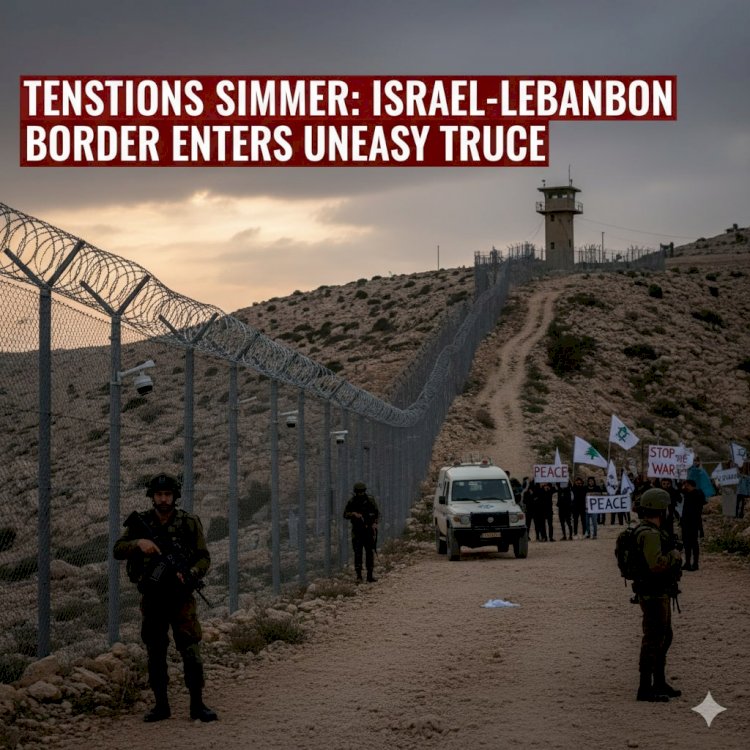Tensions Simmer: Israel-Lebanon Border Enters Uneasy Truce

Beirut/ Jerusalem, November 6, 2025 – In a dramatic twist to months of relentless cross-border skirmishes, Israel and Lebanon announced a tentative ceasefire today, halting the thunder of artillery that has echoed through the Bekaa Valley and Galilee hills for over a year. The fragile pact, brokered in shadowy backroom talks in Doha, offers a sliver of hope amid the rubble—but whispers of distrust linger like smoke from yesterday's barrages.
Rockets Fall Silent: A Breath for the Displaced
As dawn broke over Tyre's shattered waterfront, families emerged from bunkers clutching faded photos and half-eaten rations. The ceasefire, effective at midnight, silenced the Katyusha rockets that had rained down on northern Israeli kibbutzim, claiming over 200 lives since the escalation in late 2024. Lebanese officials hailed it as a "victory for restraint," pointing to Hezbollah's scaled-back operations as the linchpin. Yet, in Haifa's emergency wards, medics bandage wounds that tell a grimmer tale: 150 Israeli casualties in the past week alone, fueling calls for ironclad enforcement.
Diplomatic Jenga: One Wrong Move from Collapse
Behind closed doors, envoys from Washington, Tehran, and Paris juggled concessions like high-stakes poker chips. Israel's demand for Hezbollah's disarmament north of the Litani River clashed head-on with Lebanon's insistence on a full Israeli withdrawal from disputed Shebaa Farms. The deal? A 90-day cooling-off period, monitored by UN peacekeepers beefed up with French and Italian troops. Critics in Tel Aviv decry it as "appeasement 2.0," while Beirut's streets buzz with chants of defiance. Will this house of cards stand, or topple under the weight of old grudges?
Echoes of October: From Invasion to Impasse
Flashback to the blistering autumn of 2024, when Israeli ground forces sliced into southern Lebanon, toppling Hezbollah strongholds in a bid to dismantle the "axis of resistance." Villages like Bint Jbeil became ghost towns, their olive groves scarred by tank treads. Hezbollah's reprisals—drone swarms and tunnel ambushes—pushed the conflict to a fever pitch, drawing in Syrian proxies and straining Jordan's borders. Today's pause feels like intermission, not finale, as reconstruction crews eye billions in aid that may never materialize.
Human Cost: Stories from the Frontlines
In Nabatieh, 12-year-old Aisha clutches her brother's soccer ball, the only remnant of a home vaporized by an airstrike. "The sky stopped screaming last night," she whispers, eyes wide with fragile wonder. Across the fence in Metula, farmer Eli Cohen surveys his vineyard's pockmarked earth: "Peace? Only if they mean it this time." Aid convoys snake through checkpoints, delivering tents and trauma kits, but the real toll—shattered psyches and orphaned futures—defies easy tallies.
Horizon of Hope or Harbinger of Hell?
As fog rolls off the Mediterranean, both sides eye the horizon warily. Israeli Prime Minister Netanyahu vows "zero tolerance for violations," while Lebanon's caretaker government teeters on economic collapse, begging for Gulf lifelines. International watchdogs urge confidence-building measures: joint patrols, shared intel, maybe even a soccer match between border towns. But in the shadow of the Golan, one thing rings clear—this truce is a tightrope walk over an abyss. The world watches, holding its breath, as the Middle East's powder keg flickers but does not yet ignite.

 content-team
content-team 


















